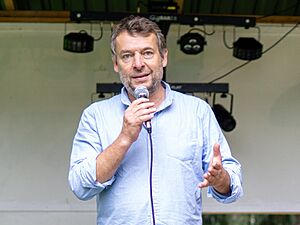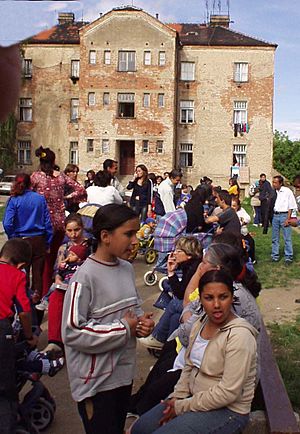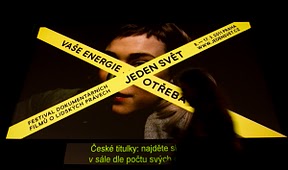People in Need facts for kids
 |
|
| Formation | 1992 |
|---|---|
| Type | Non-profit NGO |
| Purpose | Protecting human rights and providing human relief, development assistance, and social integration projects. |
| Headquarters | Prague, Czech Republic |
|
CEO
|
Šimon Pánek |
| Jan Pergler (Chairperson) | |
People in Need (often called PIN) is a Czech organization that helps people. It is a nonprofit group, which means it does not work to make money. PIN is based in Prague, Czech Republic.
This organization works in many countries around the world. It helps people who are in crisis or need support. PIN provides aid, helps communities grow, and teaches about human rights. It also runs educational programs. Šimon Pánek is the director of People in Need. As of 2022, PIN was working in more than 33 countries.
In the Czech Republic, PIN helps people join society better. It also offers helpful information and learning activities. The group wants to encourage freedom and kindness among people. Since it started in 1992, PIN has worked in almost 50 countries. Today, it is one of the biggest non-governmental organizations (NGOs) in Central and Eastern Europe.
People in Need is part of several international groups. Many different donors support its work. These include the Czech government, the European Commission, and the United States Agency for International Development. People in the Czech Republic also donate money to help.
Contents
History of People in Need
People in Need started in 1992. It was founded by Šimon Pánek, who was a student leader during the Velvet Revolution. Jaromír Štětina, a reporter who covered wars, also helped start it.
PIN first began as "The Lidové noviny Foundation." Two years later, its name changed to "The People in Need Foundation under Czech Television." In 1999, it became "People in Need," which is its name today. Šimon Pánek has been the director since 2009.
PIN works to help people and create a fair society. Its work is often seen during big emergencies. For example, it helped during the 2002 European floods in the Czech Republic. It also helped after the 2004 Indian Ocean earthquake and the 2010 Haiti earthquake. After the 2004 earthquake, people and companies in the Czech Republic gave over 130 million Czech Koruna to PIN.
Helping Communities Around the World
In Africa and Asia, PIN helps with basic needs like food and education. In countries like Belarus, Cuba, and Ukraine, PIN has supported people who want more freedom.
In the Czech Republic, PIN helps Romani people who live in difficult areas. It also organizes cultural events, like the One World Film Festival. This festival was started by Igor Blaževič. PIN also shares information and gets involved in important social issues.
PIN has done big projects in many places. For example, in Afghanistan, it helped with water systems and schools. After the 2004 Indian Ocean earthquake, it worked in Sri Lanka. In Pakistan, it helped rebuild after the 2005 Kashmir earthquake. PIN also built schools in Angola and Ethiopia. In Namibia, it helped people with HIV/AIDS. In Romania and Serbia, it supported groups of Czech people who have lived there for many generations.
In 2008, PIN helped in Myanmar after Cyclone Nargis. It also supported victims of violence in the DR Congo. In 2009, PIN helped people in the Czech Republic after serious floods.
Since 2014, People in Need has worked in Venezuela. It helps local groups and individuals who are trying to improve their country. PIN gives small grants to other non-profit groups and people. These grants support activities like helping activists in poor areas or lawyers defending people who are unfairly arrested.
Programs and Projects
Humanitarian and Development Aid
People in Need gives humanitarian aid to people affected by wars or natural disasters. Recently, PIN has helped people caught in the conflict in eastern Ukraine and the civil war in Syria.
PIN provides food, shelter, water, and emotional support to people in these countries. It also helps fix damaged homes and gives supplies for winter. They focus on giving out food, helping people earn a living again, and providing housing. This includes making sure homes have at least one warm room, helping with repairs, and giving money for rent. They also give out fuel and water. In Syria, People in Need also gives seeds and tools to farmers. In safer areas, they provide food vouchers instead of food packages.
PIN has helped people in over 50 countries in Europe, Asia, and Africa. These include DR Congo, Ethiopia, Angola, Mongolia, Cambodia, and Romania. PIN also works on long-term problems. These include a lack of good education, health care, and damage to the environment. They focus on making sure people have basic needs like water, health, education, and food. They also support local businesses and help communities manage themselves well. In Afghanistan, PIN started working in 2001 after the Taliban fell. It focused on long-term issues like helping people earn a living, education, and community growth.
Helping During the Ukraine War
The Russian invasion of Ukraine in February 2022 caused a huge crisis for millions of Ukrainians. Cities like Kyiv, Kharkiv, Kherson, and Mariupol saw heavy fighting. Fighting also happened in the Donetsk and Luhansk regions.
People in Need had been working in Ukraine since 2003. On the first day of the war, they quickly organized aid for the affected areas. They started the "SOS Ukraine Emergency Appeal," which became their most successful fundraising effort ever.
Working with partners, PIN set up a train bridge between Ukraine and Prague. This helped move and organize humanitarian aid. In the first days of the war, PIN trucks full of aid went to war-affected areas in Ukraine.
The war forced millions of people to leave their homes. Many parts of Ukrainian cities were destroyed. Important services like water and electricity were damaged, leaving hundreds of thousands without them. People in Need helped by getting water supplies to eastern Ukraine. PIN also gave money to local groups. This helped them give out food, drinking water, and hygiene products better.
Millions of people fled Ukraine to nearby countries. Most of them were women and children. To help them, People in Need worked at the border of Ukraine and Poland. People waited there for days to get to safety. PIN offered help to refugees in the Czech Republic, Moldova, Romania, and Slovakia. People in Need also provided shelter for refugees at the Ukrainian border. They built heated tents and gave important information to Ukrainians who were fleeing.
To help with the crisis, People in Need launched a website called Pomáhej Ukrajině (Help Ukraine). This website connects people who want to help with non-profit groups working with refugees.
Social Integration Program
Since 1999, PIN has worked to reduce poverty and social exclusion in the Czech Republic. It helps in poorer areas with projects that reach out to people. These include advice on housing, help for people with debt, and reducing unemployment. In the past, PIN has offered jobs, legal advice, tutoring, and help with social services. It also encouraged fun activities for children.
In summer 2006, PIN created a special department for social integration. This department offers many services for individuals and families who are socially excluded. PIN also advises city councils and towns with many socially excluded people. Their goal is to solve problems for both individuals and whole communities.
This program has over 200 staff members. This includes 130 social workers, job counselors, lawyers, and teachers. Over 300 volunteers also support them. The program works in more than 60 cities and towns in the Czech Republic and Slovakia.
Being socially excluded is often linked to debt problems. This can include unfair loans from lenders. Because of this, People in Need talked with the Czech Banking Association in 2010. They agreed to remove unfair rules for credit agreements at all Czech banks. In 2011, PIN finished a three-year campaign about unfair loans to Romani people in Slovakia. Thanks to this campaign, most companies changed how they gave out loans.
Promoting Human Rights
The Center for Human Rights and Democracy (HRD) is a part of PIN. It works in other countries. It mainly supports people and groups who are treated badly, bullied, or put in prison for their beliefs or actions. These are usually people who work independently from the government in countries with strict rulers.
PIN has worked on human rights since the late 1990s. Their main focus is supporting people who are political prisoners and their families. They also support groups that work for a better society. Families of political prisoners, especially in very strict countries like Myanmar and Cuba, get money, aid, and moral support. This help goes to many countries where the situation is always bad or getting worse. The "Friends of People in Need Club" largely funds this support. The organization also raises awareness about human rights problems around the world. It tries to get more public and political support to protect these rights.
So, HRD works in several countries with strict governments and many other places globally. A big part of PIN's work is speaking up for people who disagree with the government. They also help build a strong society in countries controlled by strict leaders. Because of its experience with former communist countries, HRD has programs in Eastern Europe (like Armenia, Belarus, and Ukraine). It also works in Latin America (like Cuba and Venezuela), Egypt, Libya, and Vietnam. PIN is also involved in other parts of Asia. For example, Myanmar is still a concern, and PIN has supported groups working for a better society there since 1997.
In November 2019, the Russian Ministry of Justice put People in Need on a list of organizations that are not wanted in Russia. The Minister of Foreign Affairs of the Czech Republic, Tomáš Petříček, said this was "absurd" and asked for an explanation. He also said that banning human rights groups in Russia showed the country's poor human rights record.
Education and Outreach
Educational programs focus on students and teachers in Czech schools and universities. They also help other groups, like people who work at job centers or the police. These programs use documentary films with discussions (like "One World at schools"). They also offer information about different cultures and global development for teachers. PIN also helps connect organizations that work on social exclusion.
People in Need focuses on giving good information to the Czech public, the government, and the media. They run long and short-term campaigns. These include film screenings, discussion evenings, creative contests, and trips for journalists. These trips help journalists learn about topics like development aid or stopping child labor. Campaigns also include public events and projects that gather information about migration and foreigners living in the Czech Republic.
PIN publishes something called the 'Predator Index'. This ranks companies that give out loans without guarantees. It looks at how clear the contracts are, if there are unfair late fees, how much a delayed payment costs, and the total cost of the loan.
One World Film Festival
Every year, People in Need organizes the biggest human rights film festival in Europe. It is held in Prague, Czech Republic, and is called One World. In 2007, UNESCO praised it for its work on "education of human rights." It is the largest documentary film festival about human rights in the world. Over one hundred films from around the world are shown. The festival looks at human rights in a broad way. So, the program includes films about political and development issues, as well as environmental and social topics. The films are shown in Prague in March. After that, they are shown in more than thirty cities across the country and in Brussels. The most popular documentaries can be watched for free on the website Promítej i ty!.
The festival also has discussions every evening with directors, human rights activists, and other experts. These happen at the Municipal Library in Prague. People in Need also gives the Homo Homini Award. This award goes to a person who has made a big difference in protecting human rights and promoting democracy peacefully. The Homo Homini Award was first given in 1994. Since 1997, it has been given out every year.
The One World festival was changed by the COVID-19 pandemic in 2020. Almost 200 screenings had to be canceled. They were moved to the DAFilms.cz online cinema.
Winners of the Homo Homini Award
Here are some of the people who have won the award:
- 1994: Sergei Kovalev
- 1997: Szeto Wah
- 1998: Ibrahim Rugova
- 1999: Oswaldo Payá Sardiñas
- 2000: Min Ko Naing
- 2001: Zackie Achmat
- 2002: Thích Huyền Quang, Thích Quảng Độ and Nguyen Van Ly
- 2003: Nataša Kandić
- 2004: Gheorghe Briceag
- 2005: Ales Bialatski and the Belarusian organization Viasna
- 2006: Svetlana Gannushkina
- 2007: Su Su Nway, Phyu Phyu Thin, and Nilar Thein
- 2008: Liu Xiaobo
- 2009: Majid Tavakoli and Abdollah Momeni
- 2010: Azimzhan Askarov
- 2011: Doctors Coordinate of Damascus
- 2012: Intiqam Aliyev
- 2013: Sapiyat Magomedova
- 2014: Su’ad Nawfal
- 2015: Black Spring (Cuba): Martha Beatriz Roque Cabello, Jorge Olivera Castillo, Ángel Juan Moya Acosta, José Daniel Ferrer García, Félix Navarro Rodríguez, Iván Hernández Carrillo, Héctor Maseda Gutiérrez, Óscar Elías Biscet González, Eduardo Díaz Fleitas, Librado Ricardo Linares García, Arnaldo Ramos Lauzurique
- 2016: Committee for the Prevention of Torture (Russia)
- 2017: Pham Doan Trang
- 2018: Francisca Ramírez
- 2019: Buzurgmehr Yorov
- 2020: Marfa Rabkova, Andrei Chapiuk, Leanid Sudalenka, and Tatsiana Lasitsa
- 2021: Mahienour El-Massry An Egyptian lawyer who has supported and defended people who were political prisoners in Egypt, even when she was in prison herself.
- 2024: Abzas Media
See also
 In Spanish: People in Need para niños
In Spanish: People in Need para niños




